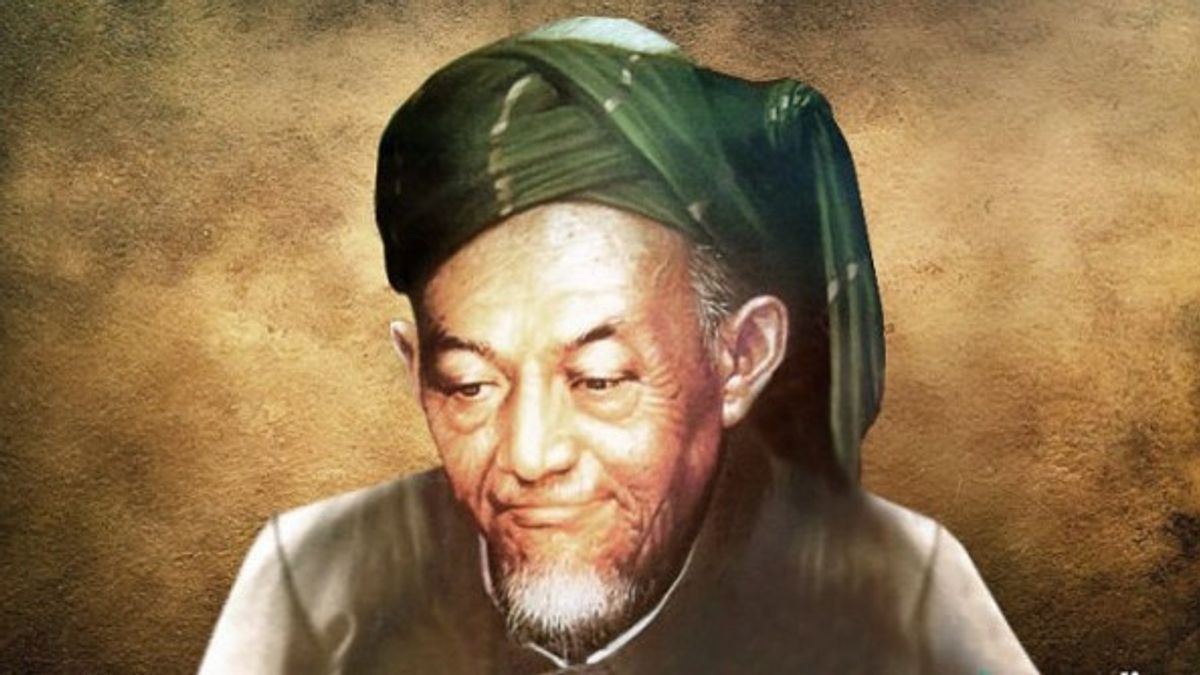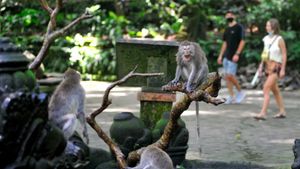JAKARTA - Kiai Hasyim Asy'ari is a prominent Islamic figure in the archipelago. As the founder of a large Islamic organization, Nahdlatul Ulama (NU), Hasyim Asy'ari is known to be reliable in all fields. Hasyim Asy'ari's progress in the world of Islamic education, for example. Hasyim Asy'ari became the pioneer of the modern boarding school Tebuireng, Jombang. The pesantren became Hasyim Asy'ari's way to educate the nation's children, especially to free the Indonesian nation from the shackles of ignorance.
Kiai Hasyim Asy'ari was born on February 14, 1871 in Gedang Village, Jombang, East Java. Since childhood, Hasyim Asy'ari was familiar with the strong life of Islamic teachings and the dynamics of life in Islamic boarding schools. Hasyim Asy'ari's father and grandfather were already famous as founders of Islamic boarding schools in Jombang.
Hasyim Asy'ari received a strong religious education from his family. In addition, he also studied Islam in Mecca since 1803. There Hashim Asy'ari studied with many prominent scholars in the Arabian peninsula.
Hasyim Asy'ari did not waste the opportunity to be in Mecca. He learned various knowledge from his teachers. His understanding is getting wider and deeper. After returning from Makkah, Hasyim Asy'ari began to encourage modern Islamic education in Java.

Wahid Hasyim, Gus Dur, Hasyim Asy'ari (nu.or.id)
The bursts of desire to serve in the world of education are getting stronger day by day. Moreover, at that time in the Dutch East Indies (Indonesia) there were only two education systems for the native people.
"The first is the education system provided for Muslim santri in Islamic boarding schools whose teaching focus is the science of religion. The second is the Western education system introduced by the Dutch colonial government with the aim of preparing students to occupy administrative positions of both low and middle levels of government. However, the number of Dutch schools for Indigenous people (Hollandsch-Inlandsche School), which was founded in early 1914, is very limited for the indigenous Indonesian people, "said Lathiful Khuluq in the book Fajar Kebangunan Ulama: Biography of KH Hasyim Asy'ari (2000).
Even so, only bumiputra from priyai circles can penetrate education. For commoners, school is like a dream in broad daylight, aka something that is impossible. Even if they had access, most of those who embraced Islam would forbid Dutch schools.
Seeing this reality, Hasyim Asy'ari became interested in creating a modern Islamic boarding school education institution. He aimed the pesantren as a tool so that the bumiputra could gain knowledge. Moreover, the Islamic boarding school also contains the value of worship. Affordable too.
The struggle at the Tebuireng Islamic Boarding School
Hasyim Asy'ari's determination to build his own pesantren was even more unanimous. It is said that the determination to educate the nation's children continues to grow along with the prayers and remembrance that he does. Hasyim Asy'ari then moved his family from Nggedang, Jombang, to Tebuireng.
In that place, Hasyim Asy'ari wanted to build a pesantren. Nevertheless, his idea was immediately opposed by all his relatives and close friends. The conflict is because Tebuireng Village is already considered a “Jahilliah” area because there is a sugar factory inherited from the Netherlands.
As an area with a large circulation of money, factory workers like to commit immorality and are far from God. They like to gamble, have fun at night markets, and become regular customers of prostitution houses. This prestige also brought in many thieves.
In that context, Tebuireng is also known as the village of the den of thieves. They like to patronize the laborers with deep pockets. In fact, they do not hesitate to scold with the threat of death if they are not given the “gratuity” they are asked to.
“This intention was initially opposed by all of his relatives and close friends. In fact, he was ridiculed and laughed at by other kiai. They know Tebuireng is a dangerous area and without religion. People call Tebuireng Village a village without humanity. The residents there have a hobby of robbing and prostitution locations are scattered along the road. Hasyim Asy'ari was not afraid. Instead, he said: Broadcasting Islam means improving people, ”wrote a report from Tempo Magazine entitled Pesantren di Sarang Penyamun (2011).
Hasyim Asy'ari's recklessness became even more complete when he founded the Islamic boarding school which is only about a hundred meters from the opposite side of the sugar factory. The pesantren, which became known as Pesantren Tebuireng, was originally just a cottage with a thatched roof with a size of 6 x 8 meters. There are only two rooms. At first there were only two students who studied knowledge. A few months later, the number of students increased to 28.
"After establishing the Tebuireng Islamic Boarding School, he colored his educational institution with traditional views and methodologies. In its development, KH. Hasyim Asy'ari has adopted a lot of classical Islamic education, which puts forward many aspects of normative, teaching and learning traditions, and ethics in learning. All of that is based on his view that these aspects have led Muslims to their golden age first, "said Abdul Hadi in the book KH Hasyim Asy'ari (2018).

In educating, Hasyim Asy'ari puts forward the development of character education. He educates his students to not only be independent from an economic and political perspective. Hasyim Asy'ari helped develop cultural lessons and various sciences.
In addition, the education taught by Hasyim Asy'ari is more about education as an adhesive, regardless of certain ethnicity or ethnicity. Most importantly, Hasyim Asy'ari taught education for the benefit of the nation.
"Talking about benefit means talking about the current conditions and realities of the people that are connected to their traditions, with the culture of their people. This is to further recognize their humanitarian interests in this world as provisions for the afterlife. Not the other way around, making them fall into the past, so they can't get up again. Furthermore, from there we build solutions to our present and future problems, "wrote Ahmad Baso in the book KH Hasyim Asy'ari: Kyai Pengabdian Untuk Negeri (2019).
However, the students at the Tebuireng Islamic Boarding School had time to study in unsettled conditions. For the first two years, they slept crammed into the booths and did not dare to press their bodies against the walls made of woven bamboo.
Not to mention, the presence of the pesantren was not really liked by the population. Often at night, the Hasyim Asy'ari Islamic Boarding School was attacked by groups of people by jabbing spears and machetes from behind walls. Hasyim Asy'ari was not afraid. He and the students then beat back the troublemakers.
The fruit, one by one the thieves left Tebuireng. Even with gambling and prostitution that was evicted by Hasyim Asy'ari and his students. Because of that, the Tebuireng pesantren began to flood up to 200 students.
Only in 1906, Pasantren Sugar Cane Ireng received recognition from the Dutch East Indies government. A century later, Pesantren Tebuireng grew rapidly and is hailed as the pioneer of modern Islamic boarding schools, at least to this day.
* Read other information about HISTORY OF NUSANTARA or read other interesting writings from Detha Arya Tifada.
MEMORY OtherThe English, Chinese, Japanese, Arabic, and French versions are automatically generated by the AI. So there may still be inaccuracies in translating, please always see Indonesian as our main language. (system supported by DigitalSiber.id)










